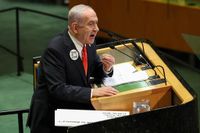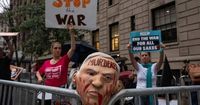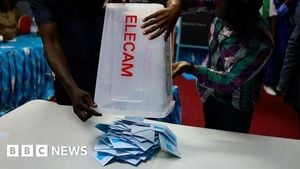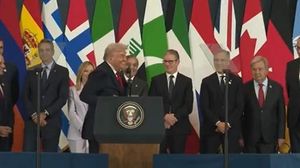On September 26, 2025, Israeli Prime Minister Benjamin Netanyahu took the stage at the United Nations General Assembly in New York, facing an audience that was, quite literally, vanishing before his eyes. As he prepared to deliver a speech meant to defend Israel’s actions in Gaza and rebuke its critics, most state delegations filed out in a coordinated protest, leaving rows of empty seats in their wake. The walkout, according to multiple outlets including Anadolu Agency and The New Indian Express, was a direct response to Israel’s military campaign in Gaza, which has resulted in the deaths of more than 65,500 Palestinians—most of them women and children—since October 2023.
Netanyahu’s address, delivered to a largely deserted hall but with a public gallery packed with supporters, was as defiant as it was controversial. He flatly denied accusations of genocide and starvation in Gaza, insisting, “Israel is deliberately feeding the people of Gaza.” He further claimed, “Israel is applying more measures to minimize civilian casualties than any military in history.” These remarks, reported by Anadolu Agency, were met with deep skepticism by much of the international community, as the United Nations and humanitarian organizations continue to warn of widespread starvation and displacement in Gaza.
The Prime Minister’s speech came at a time of unprecedented international isolation for Israel. In the days leading up to the address, countries including Australia, Canada, France, and the United Kingdom announced their recognition of an independent Palestinian state. The European Union is reportedly considering sanctions and tariffs against Israel. Meanwhile, the International Criminal Court has issued an arrest warrant for Netanyahu, accusing him of crimes against humanity—a charge he vehemently denies. The UN’s highest court is also weighing South Africa’s allegation that Israel has committed genocide in Gaza, an accusation Israel rejects entirely.
Netanyahu’s rhetoric at the UN was uncompromising. He vowed to block the creation of a Palestinian state, accusing European leaders who recognized Palestinian statehood of “pushing [Israel] into national suicide” and “rewarding Hamas.” As reported by The Hindu, he declared, “Israel will not allow you to shove a terrorist state down our throats. We will not commit national suicide because you don’t have the guts to face down the hostile media and antisemitic mobs demanding Israel’s blood.”
He also cast the conflict in Gaza as a battle with global implications. “I’m sure there are people in New York or in London or in Melbourne and elsewhere who are probably thinking, what does all of this have to do with me? And the answer is everything. Because our enemies are your enemies,” Netanyahu said, as cited by Anadolu Agency. He accused Iran and allied groups of attempting to assassinate the US president twice, a claim that further underscored his portrayal of Israel’s fight as inseparable from Western security interests.
The optics of the speech were striking. As Netanyahu approached the rostrum, delegates from numerous countries—many of whom had just recognized Palestinian statehood—stood and exited the hall in protest. Hamas, the Palestinian group that controls Gaza, called the walkout a clear sign of Israel’s “isolation” on the world stage. Taher al-Nunu, a media adviser to Hamas’s political bureau, stated, “Boycotting Netanyahu’s speech is one manifestation of Israel’s isolation and the consequences of the war of extermination.” Another senior Hamas official, Izzat al-Rishq, remarked that Netanyahu was left with “nothing but a chorus of cheerleaders who entered the UN hall only to clap in support of genocide.”
Hamas also accused Netanyahu of “repeating lies and blatant denial of the genocide, forced displacement and systematic starvation committed by him” and the Israeli military in Gaza. The group further charged that, “If he truly cared for his captives, he would end the brutal bombing, massacres and destruction of Gaza, but instead, he lies and continues to endanger their lives.” Their statement referenced the 47 hostages still held in Gaza out of the 251 seized during Hamas’s October 2023 attack on Israel, which killed about 1,200 people, mostly civilians, according to Israeli figures.
Netanyahu, for his part, used the UN platform to issue a warning to Hamas: unless the hostages are released, Israel will continue its offensive. He insisted that Gaza would remain “demilitarized” under Israeli security control, with the possibility of a civilian authority being established. He also praised US President Donald Trump—who was scheduled to meet with Netanyahu in Washington on September 29—for his support, though Trump signaled there were limits, stating he would not allow Israel to annex the occupied West Bank.
Protests against Netanyahu’s visit weren’t confined to the UN floor. Outside, demonstrators gathered in Times Square, calling for his arrest. “War criminals don’t deserve any peace of mind. They don’t deserve any sleep,” said Andrea Mirez, a protester who participated in an overnight demonstration outside Netanyahu’s hotel, as reported by The Hindu. Meanwhile, Iran boycotted the speech entirely, displaying photos of those it claimed were killed in Israeli bombings on its delegation’s table.
Netanyahu’s speech was broadcast in part on Israeli military loudspeakers in Gaza, a gesture he said was intended for both Hamas leaders and the remaining hostages. “We have not forgotten you—not even for a second. The entire nation is with you, and we will not be silent or let up until we bring you all home, the living and the dead alike,” he said, briefly switching to Hebrew.
The humanitarian crisis in Gaza remains dire. According to United Nations-accepted health ministry figures, Israel’s military campaign has killed at least 65,549 Palestinians, most of them civilians, and displaced 90 percent of Gaza’s population. Starvation is now widespread, despite Netanyahu’s insistence that Israel is providing food aid. The truce reached earlier in the year required Israel to withdraw from southern Lebanon by January 2025, but Israeli forces remain at five outposts, adding another layer of regional tension.
Palestinian Authority President Mahmoud Abbas addressed the General Assembly via video the day before Netanyahu’s speech, after being denied a US visa. Abbas welcomed the wave of recognitions of Palestinian statehood but called for further international action, saying, “The time has come for the international community to do right by the Palestinian people and help them realize their legitimate rights to be rid of the occupation and to not remain a hostage to the temperament of Israeli politics.”
As the world digests the fallout from Netanyahu’s fiery UN appearance, the deep divisions over the conflict in Gaza—and the future of the Palestinian people—remain as stark as ever. The walkout at the General Assembly, the protests in New York, and the ongoing devastation in Gaza all point to a crisis that continues to reverberate far beyond the borders of the Middle East.





